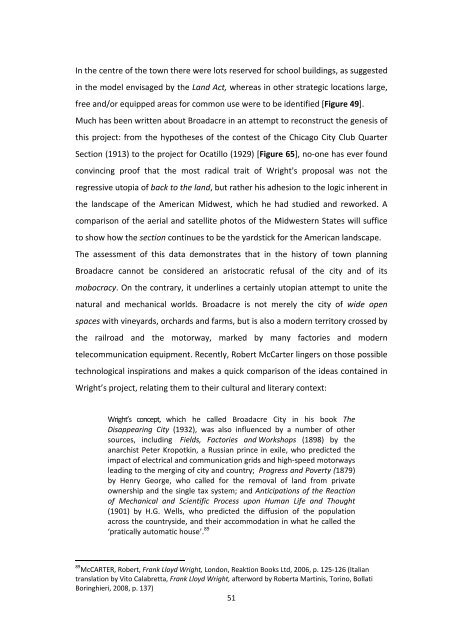building the american landscape - Univerza v Novi Gorici
building the american landscape - Univerza v Novi Gorici
building the american landscape - Univerza v Novi Gorici
You also want an ePaper? Increase the reach of your titles
YUMPU automatically turns print PDFs into web optimized ePapers that Google loves.
In <strong>the</strong> centre of <strong>the</strong> town <strong>the</strong>re were lots reserved for school <strong>building</strong>s, as suggested<br />
in <strong>the</strong> model envisaged by <strong>the</strong> Land Act, whereas in o<strong>the</strong>r strategic locations large,<br />
free and/or equipped areas for common use were to be identified [Figure 49].<br />
Much has been written about Broadacre in an attempt to reconstruct <strong>the</strong> genesis of<br />
this project: from <strong>the</strong> hypo<strong>the</strong>ses of <strong>the</strong> contest of <strong>the</strong> Chicago City Club Quarter<br />
Section (1913) to <strong>the</strong> project for Ocatillo (1929) [Figure 65], no‐one has ever found<br />
convincing proof that <strong>the</strong> most radical trait of Wright's proposal was not <strong>the</strong><br />
regressive utopia of back to <strong>the</strong> land, but ra<strong>the</strong>r his adhesion to <strong>the</strong> logic inherent in<br />
<strong>the</strong> <strong>landscape</strong> of <strong>the</strong> American Midwest, which he had studied and reworked. A<br />
comparison of <strong>the</strong> aerial and satellite photos of <strong>the</strong> Midwestern States will suffice<br />
to show how <strong>the</strong> section continues to be <strong>the</strong> yardstick for <strong>the</strong> American <strong>landscape</strong>.<br />
The assessment of this data demonstrates that in <strong>the</strong> history of town planning<br />
Broadacre cannot be considered an aristocratic refusal of <strong>the</strong> city and of its<br />
mobocracy. On <strong>the</strong> contrary, it underlines a certainly utopian attempt to unite <strong>the</strong><br />
natural and mechanical worlds. Broadacre is not merely <strong>the</strong> city of wide open<br />
spaces with vineyards, orchards and farms, but is also a modern territory crossed by<br />
<strong>the</strong> railroad and <strong>the</strong> motorway, marked by many factories and modern<br />
telecommunication equipment. Recently, Robert McCarter lingers on those possible<br />
technological inspirations and makes a quick comparison of <strong>the</strong> ideas contained in<br />
Wright’s project, relating <strong>the</strong>m to <strong>the</strong>ir cultural and literary context:<br />
Wright’s concept, which he called Broadacre City in his book The<br />
Disappearing City (1932), was also influenced by a number of o<strong>the</strong>r<br />
sources, including Fields, Factories and Workshops (1898) by <strong>the</strong><br />
anarchist Peter Kropotkin, a Russian prince in exile, who predicted <strong>the</strong><br />
impact of electrical and communication grids and high‐speed motorways<br />
leading to <strong>the</strong> merging of city and country; Progress and Poverty (1879)<br />
by Henry George, who called for <strong>the</strong> removal of land from private<br />
ownership and <strong>the</strong> single tax system; and Anticipations of <strong>the</strong> Reaction<br />
of Mechanical and Scientific Process upon Human Life and Thought<br />
(1901) by H.G. Wells, who predicted <strong>the</strong> diffusion of <strong>the</strong> population<br />
across <strong>the</strong> countryside, and <strong>the</strong>ir accommodation in what he called <strong>the</strong><br />
‘pratically automatic house’. 89<br />
89 McCARTER, Robert, Frank Lloyd Wright, London, Reaktion Books Ltd, 2006, p. 125‐126 (Italian<br />
translation by Vito Calabretta, Frank Lloyd Wright, afterword by Roberta Martinis, Torino, Bollati<br />
Boringhieri, 2008, p. 137)<br />
51
















